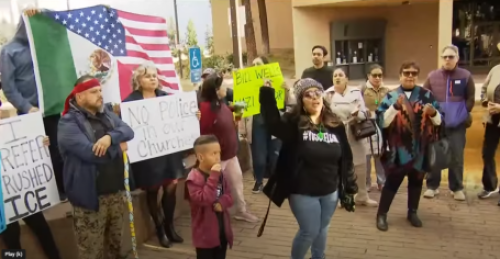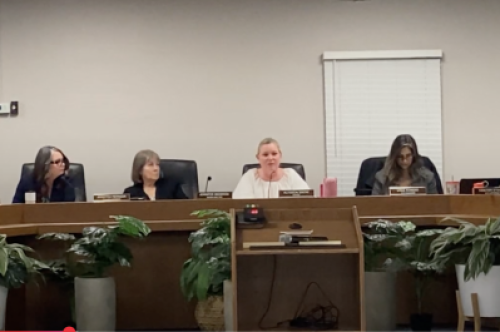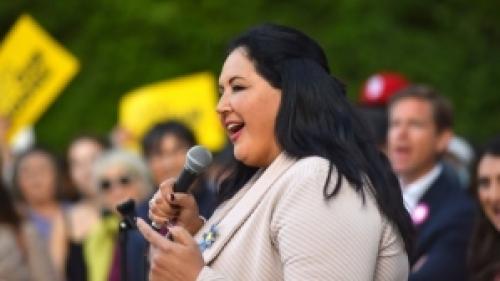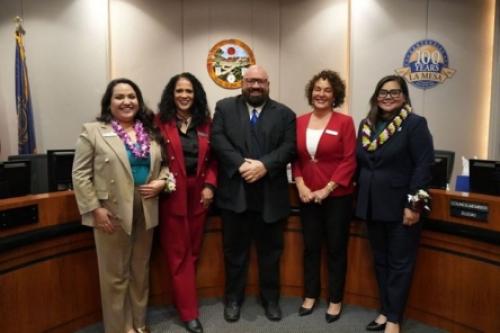By Miriam Raftery
View video of full Council hearing (Immigration agenda item begins at 37 minutes.)
January 29, 2025 – Emotions ran high during yesterday’s El Cajon City Council meeting, where a packed chamber heard testimony from 88 members of the public over a proposed over immigration enforcement resolution, followed by a heated Council debate that divided the all-Republican members during a hearing that ran over five hours.
The measure introduced by Mayor Wells, a revision from a version heard two weeks ago, aims to authorize El Cajon police to comply with federal immigration enforcement officials within the limits of state law and the Constitution for the purpose of removing violent criminals.
But the action comes on the same day that the White House Press Secretary indicated that the Trump administration views all undocumented immigrants as “criminals” even though crossing the border itself is a misdemeanor on the first offense, not a felony or violent crime.
Sweeps by Immigration and Customs Enforcement (ICE) have begun nationwide, picking up many immigrants with no criminal record—including an El Cajon man with no criminal record who was awaiting his asylum hearing when arrested this week by Immigration and Customs Enforcement (ICE) at his home in front of his five-year-old daughter, Councilman Michelle Metschel revealed in an impassioned speech.
 “If this was just about violent criminals, I would be all for it,” Metschel (photo, right) said. “But today is a pivotal moment,” she added, noting that the Council’s decision would “change the course of history” for the city and many of its residents. She said El Cajon’s biggest crime problem was drug criminals comprising a portion of the homeless population, “not a single father raising his young girl, who was arrested down the street from me...He worked a full-time job and had a court date to become legal...His only crime was to come across the border.”
“If this was just about violent criminals, I would be all for it,” Metschel (photo, right) said. “But today is a pivotal moment,” she added, noting that the Council’s decision would “change the course of history” for the city and many of its residents. She said El Cajon’s biggest crime problem was drug criminals comprising a portion of the homeless population, “not a single father raising his young girl, who was arrested down the street from me...He worked a full-time job and had a court date to become legal...His only crime was to come across the border.”
(Editor's note: the name of the arrested immigrant is Ulysses Gomez, according to Councilmember Metschel. ECM has learned that a man by this name had two prior arrests locally, according to the city manager, but that individual was never charged with or convicted of any crime, according to Court records. See full details in an update at the bottom of this story.)
Metschel made clear that she does not support El Cajon become a sanctuary city and wants to see violent criminals removed, but could not support the resolution after several dozen speakers voiced fears of authorities targeting people with brown skin and having to carry citizenship papers to avoid being sent to detention, and that many parents are now afraid to send their children to school, or report crimes to police. “This makes us look like racists. I want no part of it,.” Metschel affirmed, voicing dismay at "hateful rhetoric" by some speakers.
While some speakers voiced fear over authorizing police to cooperate with federal immigration authorities could lead to police providing information that could lead to arrests of people with no criminal record or even detention of citizens without papers, others urged the Council to support the measure, voicing concern for public safety. Though opponents outnumber supporters, both sides drew large turnouts. The hearing was boisterous, with the audience frequently interjecting applause or jeers and the mayor threatening several times to clear the room if the audience wouldn'td quiet down.
Glenn Bagge, an El Cajon business owner, stated that ICE claims that are “650,000 criminals running loose in the U.S.” who are undocumented. “To not allow our police officers to deal with these criminals in the proper fashion, to deal with federal agents, would be criminal,” he said.
Cory Gautereaux, a veteran, said that an immigrant who assaulted the young daughter of a Navy Seal was initially shielded from ICE due to state laws, which prohibit law enforcement from handing over undocumented immigrants unless they have been convicted of a violent crime. ICE did eventually gain access and found child pornography on the suspect’s phone, Gautereaux said.
Of note, immigrants commit crimes at far lower rates than citizens; if an undocumented immigrant is charged with a serious felony, under California’s SB 54 law, they would still be held accountable through the criminal justice system and if found guilty, could then be eligible for deportation.
Speakers against the resolution included representatives of immigrants’ rights and nonprofit groups.
Mejgan Afshan, executive director of Borderlands for Equity, serves many immigrants and refugees in East County including Mexicans, Afghans, Somalis, Chaldeans and more. “There are children scared of going to school for fear of losing their parents,” she said, referencing the Trump administration’s policy change this week allowing ICE to enter schools, churches and hospitals. “Councilmembers must avoid fearmongering and uplift the dignity of all residents,” she urged.
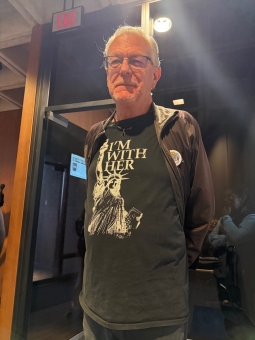 Yusef Miller, a cofounder of the North County Equity and Justice Coalition and Activist San Diego board member, stated, ”This is not about law and order. If it was, we would not be releasing all those people who stormed our capitol,” referencing Trump’s sweeping pardons and sentence commutations for all 1,500+ insurrectionists including those convicted of assaulting police officers. “What we see here is an attack on our brown community.” He likened the situation to the Fugitive Slave Act, which resulted in many blacks in free states being sent back to slavery. “Do you support families, or do you support those who will bring fear...into our communities?” he asked the Council.
Yusef Miller, a cofounder of the North County Equity and Justice Coalition and Activist San Diego board member, stated, ”This is not about law and order. If it was, we would not be releasing all those people who stormed our capitol,” referencing Trump’s sweeping pardons and sentence commutations for all 1,500+ insurrectionists including those convicted of assaulting police officers. “What we see here is an attack on our brown community.” He likened the situation to the Fugitive Slave Act, which resulted in many blacks in free states being sent back to slavery. “Do you support families, or do you support those who will bring fear...into our communities?” he asked the Council.
Brian Kougl (photo, left) with the San Diego organizing project, wearing a T-shirt with the statue of liberty proclaiming ‘I’m with her,’ said mass deportations are unpatriotic, immoral and wrong. “You should not support the hate-filled agenda of a delusional convicted felon,” he said of President Donald Trump, who has 36 felony convictions.
Immigration lawyer Maria Chavez with Partner for Advancement of New Americans said she represents immigrants, refugees and asylum seekers in El Cajon. “I fight for them every single day, and you need to, too,” she stated.
Dilkhwaz Ahmed with License to Freedom, an El Cajon nonprofit helping immigrants and refugees who are victims of violence, implored the Council to vote down the resolution. She noted that many immigrants have endured horrible conditions, such as an Afghan woman who was “raped over and over again” on her journey here; such individuals could face physical harm or death if deported. Though refugees are here legally, Trump has blocked new refugees from entering and has threatened to remove protected status from some refugees in the U.S., which could include Afghans.
Some likened the national immigration crackdown to fascism and Nazism. Nicole Bacca, a nurse, observed, ”Two weeks ago we saw Elon Musk onstage give Nazi salutes.” Trump has named Musk to head up a committee charged with improving government efficiency. She noted that earlier campaign promises to deport only violent criminals have proven false, with long-term residents with no criminal records now being taken into detention camps or deported and even churches and schools subject to seizure of immigrant children and parents. “Call it what it is—fascism, while people like Bill Wells seek power,” she said. “No surrounding cities are doing this...Choose compassion over fear and division,” she concluded.
An immigrant woman said she feared being stopped for papers, likening the situation to Jews forced to wear yellow stars before they were mass deported and millions killed in Hitler’s concentration camps during World War II. A Native American woman voiced concerns over Native Americans being stopped and said her grandmother, a Native-born American, was once deported because she couldn't speak English.
Sam Halpern said his family arrived in the 1800s to escape persecution. “Our nation was built by immigrants,” he said, noting that our nation has historically welcomed immigrants seeking freedom. He said this should include “freedom from jackboots at the door. Why do we rush to intimidate people seeking the American dream?”
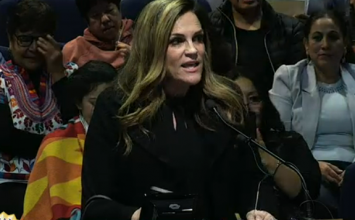 But Republican Amy Reichert (photo, right) with Reform San Diego denounced as “offensive” speakers who invoked Nazism and the Holocaust. She said she was raised Jewish, then added, “I gave my heart to Jesus in my 30s. Jesus did seek asylum—legal asylum,” she added, drawing laughter from the crowd. She voiced anger at nonprofit leaders who help migrants as “profiting off illegal immigration” and dismissed fears voiced by many speakers, then threatened, “The only people who should be afraid are the people who vote against this. There will be ramifications.”
But Republican Amy Reichert (photo, right) with Reform San Diego denounced as “offensive” speakers who invoked Nazism and the Holocaust. She said she was raised Jewish, then added, “I gave my heart to Jesus in my 30s. Jesus did seek asylum—legal asylum,” she added, drawing laughter from the crowd. She voiced anger at nonprofit leaders who help migrants as “profiting off illegal immigration” and dismissed fears voiced by many speakers, then threatened, “The only people who should be afraid are the people who vote against this. There will be ramifications.”
After the hearing, Reichert sent out an e-mail blast to conservative followers, with a headline claiming that the Council majority had voted to “keep sanctuary city status.” That is false, since El Cajon has never been a sanctuary city and every council member has voiced opposition to sanctuary city policies. No new protections for immigrants were adopted, nor were any existing ones removed by Councilmembers.
Update: After thi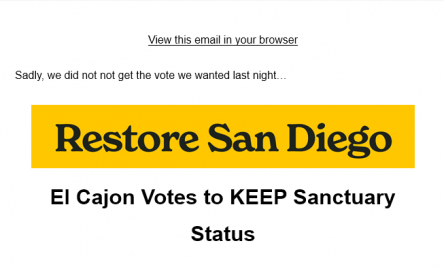 s article ran, Reichert emailed ECM stating, "I never called El Cajon a Sanctuary city in my email."
s article ran, Reichert emailed ECM stating, "I never called El Cajon a Sanctuary city in my email."
This is also untrue. See screenshot, left, with headline in her original email.
One of the final speakers was Bud Collins, who has worked with councilmembers on homeless outreach and said he believes that all love El Cajon. He urged Council to pray and ask, “What would the Lord have you do?” He then cited a Bible verse: “Love your neighbor as yourself.”
A vigorous council debate followed public testimony in what the Mayor acknowledged was “the most contentious Council meeting ever.”
Councilmember Metschel led off by denouncing hate and making clear that she supported a middle ground—not becoming a sanctuary city, but neither committing to a path to support federal actions that instill fear across many community members and could result in deportations of people with no criminal record, like her neighbor, ripped apart from his 5-year-old daughter.
Later she revealed, “Nobody knows where the little girl is. It’s crucial that our police officers have trust in the entire community, no matter what color, what religion they are.” If we lose that, we are less safe as a community,” she said, noting that some would be afraid to report crimes as witnesses or victims.
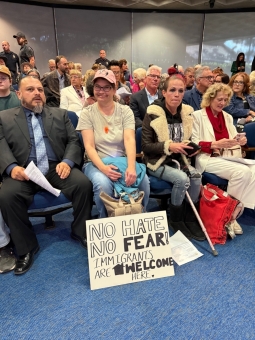 She acknowledged, “This could be the end of my political career. I don’t care, because I stand up for the people here.”
She acknowledged, “This could be the end of my political career. I don’t care, because I stand up for the people here.”
Councilman Gary Kendrick talked about his mother, who was born in Czechoslovakia. In 1939, with Hitler in power, her best friend and her friend’s family disappeared, as well as her boss, who was Jewish and never heard from again. Kendrick’s mother married a U.S. soldier and the family often vacationed in Mexico. But when Kendrick was 12, he recalled a checkpoint officer saw her European-style smallpox vaccination on her arm and asked for her passport, which she didn’t have with her. “I was scared out of my mind...That was 50 years ago and I’m still traumatized,” Kendrick said, adding that the experience resonates today with what many immigrants now fear could happen here.
“If we comply with the feds, it’s like a blank check,” he pointed out, adding that the city doesn’t know all that the feds may ask of local authorities. “It keeps changing,” he said. “We have 70 ethnic groups in El Cajon and we get along remarkable well. We don’t have gang wars. I did my research and found out that immigrants commit half (the rate) of crimes that citizens do...They pay landlords and do jobs others won’t,” noting that most agricultural workers are immigrants, including many who are not documented. “I’ve listened to both sides....I am concerned about the criminal element,” he acknowledged.
Kendrick and Metschel then introduced an alternative resolution that they drafted before the meeting. It praised the contributions of immigrants and declared intent for the city to follow state law, which already allows police to cooperate with federal immigration authorities for violent criminal undocumented immigrants.
But Councilman Phil Ortiz, whose district is predominantly Latino and Middle Eastern immigrants and whose grandmother came here as a pregnant immigrant, objected. Ortiz stated that “our rules and laws” are what makes America different from other nations. He cited a World Health Organization estimate that there are 2.5 million people worldwide living in poverty, and that we can’t let everyone into the U.S. He praised the presidents of El Salvador and Argentina for reforms that he said reduced crime and poverty.
“I don’t see any issue with our police, if the come across these people, to call ICE,” he said. While acknowledging immigrants’ contributions to our economy, insisted Ortiz, who coauthored the Mayor’s resolution. “The rule of law has to apply.”
Councilman Steve Goble sought to find a middle ground, asking numerous questions and introducing several alternative proposals that failed to win adequate support for adoption. While he made clear that he wants violent criminals removed, he observed, “The question is how to get them out of our city...who’s going to do it?” He later noted, “We have so much to do with homelessness, we can’t take on immigration...I don’t think we can assist with federal enforcement action,” he added, noting state laws prohibiting most cooperation. “Let the state and the feds fight it out,” he said of conflicting laws, “and let me concentrate on serve and protect.”
 Mayor Bill Wells (photo, right) spoke last, insisting that the resolution isn’t about racism or Nazism. “I think this is about a war that ended on November 5th. It’s about Trump and non-Trump, progressivism versus conservatism.” He added that 57% of the people in El Cajon voted for Trump “and knew where he stood on immigration.” He reiterated his view that if local police come into contact with an immigrant who is a gang member, for example, if police could cooperate with immigration officers, “We should.”
Mayor Bill Wells (photo, right) spoke last, insisting that the resolution isn’t about racism or Nazism. “I think this is about a war that ended on November 5th. It’s about Trump and non-Trump, progressivism versus conservatism.” He added that 57% of the people in El Cajon voted for Trump “and knew where he stood on immigration.” He reiterated his view that if local police come into contact with an immigrant who is a gang member, for example, if police could cooperate with immigration officers, “We should.”
In the end, the Mayor’s resolution failed on a 3-2 vote with Councilmembers Kendrick, Metschel and Goble opposed, while Mayor Wells and Councilmember Ortiz voted in support.
Read the Mayor’s revised resolution that failed passage on pages 57-59 from City Council agenda attachments.
View ECM’s prior coverage on this resolution:
https://www.eastcountymagazine.org/el-cajon-council-will-vote-today-controversial-immigration-resolution
https://www.eastcountymagazine.org/latino-leaders-give-earful-el-cajon-city-council-over-proposed-immigration-resolution
Update Feb. 5, 2025: A man named Ulysses Gomez, the same name as the immigrant arrested by ICE whom Councilwoman Metschel said was separated from his daughter,, did have a prior arrest in 2017 for driving under the influence and was ordered deported during Trump’s first presidency, then was arrested again in 2020 on a domestic violence accusation, according to El Cajon City Manager Graham Mitchell. Mitchell suggests that ICE may have been following up on the 2017 deportation warrant.
However, A check of San Diego Superior Court records by ECM found no listing for Ulysses Gomez, indicating that no trial occurred. Mitchell told ECM that it appears " the DA decided not to pursue either of the cases, so he was arrested for, but not charged or convicted.”
The arrest by ICE last week suggests that the Trump administration may be including individuals who were accused but not convicted of crimes, raising the possibility that innocent individuals could wind up deported to their home countries or potentially locked up in Guantanamo, where the Trump administration says it wants to send 30,000 deportees. Metschel has advised ECM that since this article ran, Gomez's daughter has been sent to stay with family members. Gomez was sent to the Otay Mesa detention facility pending deportation.
Correction: Councilmember Metschel voted no on both the Mayor's resolution and Coucilman Goble's compromise measure. Councilman Ortiz voted in favor.

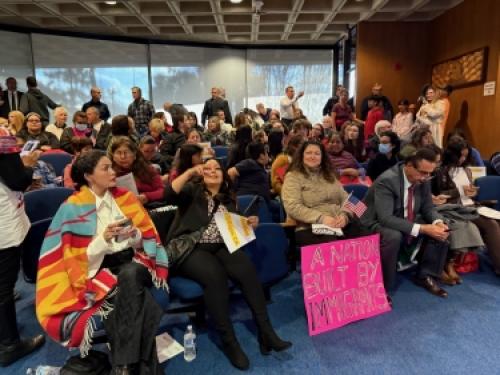
 “If this was just about violent criminals, I would be all for it,” Metschel (
“If this was just about violent criminals, I would be all for it,” Metschel ( Yusef Miller, a cofounder of the North County Equity and Justice Coalition and Activist San Diego board member, stated, ”This is not about law and order. If it was, we would not be releasing all those people who stormed our capitol,” referencing Trump’s sweeping pardons and sentence commutations for all 1,500+ insurrectionists including those convicted of assaulting police officers. “What we see here is an attack on our brown community.” He likened the situation to the Fugitive Slave Act, which resulted in many blacks in free states being sent back to slavery. “Do you support families, or do you support those who will bring fear...into our communities?” he asked the Council.
Yusef Miller, a cofounder of the North County Equity and Justice Coalition and Activist San Diego board member, stated, ”This is not about law and order. If it was, we would not be releasing all those people who stormed our capitol,” referencing Trump’s sweeping pardons and sentence commutations for all 1,500+ insurrectionists including those convicted of assaulting police officers. “What we see here is an attack on our brown community.” He likened the situation to the Fugitive Slave Act, which resulted in many blacks in free states being sent back to slavery. “Do you support families, or do you support those who will bring fear...into our communities?” he asked the Council. But Republican Amy Reichert (
But Republican Amy Reichert (
 She acknowledged, “This could be the end of my political career. I don’t care, because I stand up for the people here.”
She acknowledged, “This could be the end of my political career. I don’t care, because I stand up for the people here.” Mayor Bill Wells (
Mayor Bill Wells ( “If this was just about violent criminals, I would be all for it,” Metschel (
“If this was just about violent criminals, I would be all for it,” Metschel ( Yusef Miller, a cofounder of the North County Equity and Justice Coalition and Activist San Diego board member, stated, ”This is not about law and order. If it was, we would not be releasing all those people who stormed our capitol,” referencing Trump’s sweeping pardons and sentence commutations for all 1,500+ insurrectionists including those convicted of assaulting police officers. “What we see here is an attack on our brown community.” He likened the situation to the Fugitive Slave Act, which resulted in many blacks in free states being sent back to slavery. “Do you support families, or do you support those who will bring fear...into our communities?” he asked the Council.
Yusef Miller, a cofounder of the North County Equity and Justice Coalition and Activist San Diego board member, stated, ”This is not about law and order. If it was, we would not be releasing all those people who stormed our capitol,” referencing Trump’s sweeping pardons and sentence commutations for all 1,500+ insurrectionists including those convicted of assaulting police officers. “What we see here is an attack on our brown community.” He likened the situation to the Fugitive Slave Act, which resulted in many blacks in free states being sent back to slavery. “Do you support families, or do you support those who will bring fear...into our communities?” he asked the Council. But Republican Amy Reichert (
But Republican Amy Reichert (
 She acknowledged, “This could be the end of my political career. I don’t care, because I stand up for the people here.”
She acknowledged, “This could be the end of my political career. I don’t care, because I stand up for the people here.” Mayor Bill Wells (
Mayor Bill Wells (
